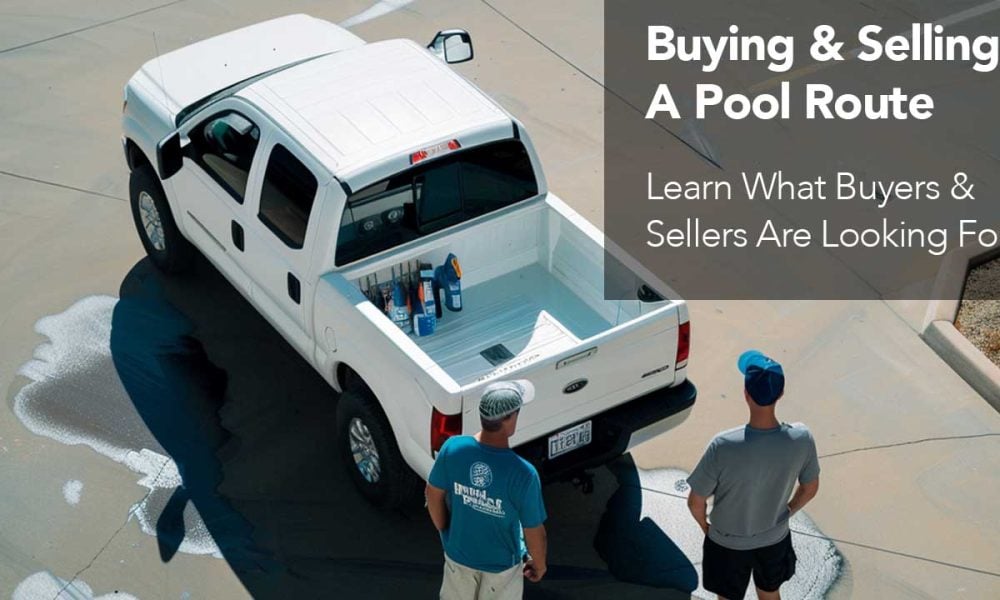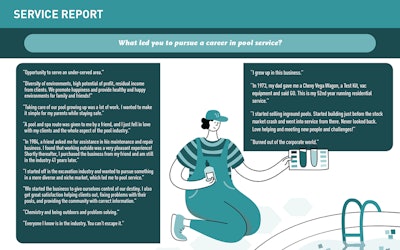When considering the purchase or sale of a pool route, understanding the intricacies involved is crucial for both buyers and sellers. Chris Webb from National Pool Route Sales (NPRS) shared valuable insights on how to navigate this complex process effectively.
“When working with a pool company and trying to determine its value, the approach we take involves a multiple of the monthly recurring service rate. This can typically range from eight to twelve times the service rate,” said Webb. This straightforward valuation method ensures that both buyers and sellers have a clear understanding of the route’s worth.
Webb elaborated on the regional disparities that can affect route valuation. “There just seems to be certain pockets. San Diego, for instance, sold for a premium for many years, then couldn’t find a buyer to pay that premium anymore because we’re going to deal with what the market says. If the market doesn’t want to pay it, the market is not going to pay it.” This highlights the importance of understanding local market trends and conditions, which can significantly impact the valuation process.

Buying a Route
When it comes to buying a pool route, there are several critical factors to consider. “Buyers in the marketplace are savvy about rates,” Webb emphasized. “Make sure your rates are in the top 50% of your marketplace.” This means that if the low-end rates are $140, mid-range is $150, and high-end is $160, positioning your rates just above $150 makes the route more attractive.
Flexibility is another crucial aspect. “If you have the flexibility to sell a piece of the route, it opens up opportunities for buyers with different budgets,” Webb explained. This approach helps match buyers’ financial capabilities with the sellers’ offerings, facilitating smoother transactions.
The geographic location of the route is also a significant consideration. Webb mentioned, “Buyers need to ensure that the accounts are where they want to be. For instance, in central Florida, some buyers might look at accounts spread across different regions, but it’s essential to ensure they are manageable given the local traffic and geography.”
Tips for Buyers:
| Category | Considerations | Details |
|---|---|---|
| Valuation | Monthly Recurring Service Rate | Ensure the purchase price aligns with the 8-12 times monthly service rate benchmark. |
| Location | Geography of Accounts | Accounts should be within a manageable and desirable area. |
| Financials | Average Monthly Amount | Review the average monthly service amount to assess overall revenue potential. |
| Yearly Net Income | Confirm the yearly net income to ensure the route is profitable. | |
| Payment History | Examine payment history to gauge the reliability and consistency of income. | |
| Route Size | Number of Accounts | Ensure the number of accounts is manageable and fits within your capacity. |
| Flexibility | Willingness of Seller to Divide Route | Look for sellers open to negotiating smaller portions of larger routes to match your budget. |
| Training & Support | Seller Training | Confirm the seller is prepared to provide necessary training for a smooth transition. |
| Customer Base | Client Satisfaction | Gauge the satisfaction and loyalty of existing customers. |
| Reputation | Seller’s Reputation | Evaluate the seller’s reputation for trustworthiness and professionalism. |
| Average Age of Accounts | Average Age of Accounts | Determine the average age of accounts to assess client stability and potential retention. |
Selling a Route
For sellers, presenting an attractive route to potential buyers involves several strategic steps. “One key thing is to keep your rates competitive,” Webb advised. “Don’t avoid raising your rates just because you’re thinking of selling. Run your business as you normally would.”
Sellers should also consider the size and scope of the route they are offering. Webb noted, “If you’re looking to divest, being flexible with the number of pools you’re willing to sell can be beneficial. For example, if a buyer can only afford 40 pools but you have 90, being willing to sell a smaller portion can make the deal more attractive.”
Documentation and transparency are crucial in the selling process. “It’s not just about how much you get paid, but what you can document,” Webb explained. “If your business makes $200,000 and you pay yourself $195,000, we look at the total benefit to the owner, not just the net income.”
Webb also emphasized the importance of being mentally prepared for the sale. “This industry is very personal. You’re in charge of pools where families swim, and you’ve built long-term relationships. Being mentally ready to hand off your accounts to someone new is essential.”
Tips for Sellers:
| Category | Considerations | Details |
|---|---|---|
| Valuation | Accurate Valuation | Ensure your route is accurately valued based on industry multiples and recent market trends. |
| Market Conditions | Regional Market Trends | Consider the current market trends in your region to price your route competitively. |
| Pricing Flexibility | Willingness to Negotiate | Be open to negotiating the terms of the sale to attract serious buyers. |
| Training & Transition | Seller Training | Be prepared to offer comprehensive training to ensure a smooth transition for the buyer. |
| Client Relations | Customer Satisfaction | Maintain good relationships with clients to enhance the attractiveness of your route. |
| Reputation | Seller’s Reputation | Build and maintain a positive reputation to enhance the value of your route. |
| Documentation | Complete Records | Ensure all route documentation and records are up-to-date and complete for the buyer. |
Buying a Route
National Pool Route Sales leverages advanced technology and a comprehensive database to connect buyers and sellers efficiently. Their website, features a detailed listing of routes available for sale, broken down by region and state. Each listing includes critical information such as the number of pools (both residential and commercial), monthly service amounts, yearly net income from service and repairs, average age of accounts, payment history, location of accounts, purchase price, training period, guarantee period, and a covenant not to compete period.


In addition to connecting buyers and sellers through their online marketplace National Pool Route Sales also offers the Million Dollar Pool Man program, taught by Charles Baird, a renowned businessman and consultant in the Pool Service and Repair Industry. Baird has helped over 10,000 pool service professionals achieve success over the past 40 years.
If you’re a pool professional considering buying or selling a route, visit poolroutesales.com to see the latest routes listed for sale or to contact them about selling your route. Their comprehensive database and expert guidance can help you navigate the process smoothly and efficiently.
Ready to Take a Deeper Dive?
Listen to our entire conversation with Chris Webb of National Pool Route Sales on the Pool Magazine Podcast.
The post Buying & Selling a Pool Route With National Pool Route Sales appeared first on PoolMagazine.com – Get The Latest Pool News.








